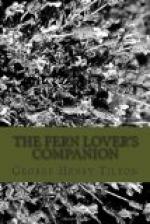[Illustration: Sori of Scolopendrium vulgare]
(1) Scolopendrium vulgare
PHYLLITIS SCOLOPENDRIUM
Fronds thick and leathery, oblong-lanceolate from an auricled, heart-shaped base, ten to twenty inches long and one to two inches wide. Margin entire, bright green.
In shaded ravines under limestone cliffs. Chittenango Falls, and Scolopendrium Lake, central New York, and Tennessee. Also, locally in Ontario and New Brunswick. One of the rarest of our native ferns, although very common in Great Britain. This plant is said to be easily cultivated, and to produce numerous varieties. According to Woolson, “No rockery is complete without the Hart’s Tongue, the long, glossy, undulating fronds of which are sufficiently unique to distinguish any collection.” In cultivation it “needs light protection through the winter in northern New England.”
[Illustration: Hart’s Tongue. Scolopendrium vulgare (Base of calcareous rocks, Owen Sound, Ontario, Canada)]
WALKING FERN. WALKING LEAF
Camptosorus
Fruit-dots oblong or linear as in Asplenium, but irregularly scattered on either side of the reticulated veins of the simple frond, the outer ones sometimes confluent at their ends, forming crooked lines (hence, the name from the Greek meaning crooked sori). Only one species within our limits.
Camptosorus rhizophyllus
Fronds evergreen, leathery, four to eighteen inches long, heart-shaped at the base, but tapering towards the apex, which often roots and forms a new plant. Veins reticulated. The auricles of this species are sometimes elongated and may even take root.
This curious and interesting fern is one of the finest for rockeries, the tips taking root in rock-fissures. Shaded limestone, or sometimes other rocks. Shapleigh and Winthrop, Me., rarely in New Hampshire (Lebanon), and Connecticut, Mt. Toby, Mass., and western New England; also Canada to Georgia and westward.
[Illustration: Walking Fern. Camptosorus rhizophyllus]
THE SHIELD FERNS
THE CHRISTMAS AND HOLLY FERNS
Polystichum
These have been grouped with the wood ferns, but are now usually placed under the genus Polystichum, which has the sori round and covered with a circular indusium fixed to the frond by its depressed center. The wood ferns, on the other hand, have a kidney-shaped indusium attached to the fronds by the sinus. (Polystichum is the Greek for many rows, the sori of some species being in many ranks.)
(1) THE CHRISTMAS FERN
Polystichum acrostichoides. Aspidium acrostichoides
Stipes clothed with pale, brown scales. Frond rigid and evergreen, one to two feet long, lanceolate, pinnate. Pinnae linear-lanceolate, scythe-shaped, auricled on the upper side, and with bristly teeth; fertile pinnae contracted toward the top, bearing two rows of sori, which soon become confluent and cover the entire surface. Indusium orbicular, fixed by its depressed center.




